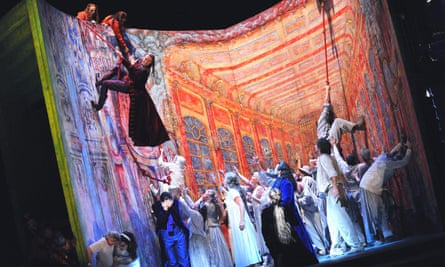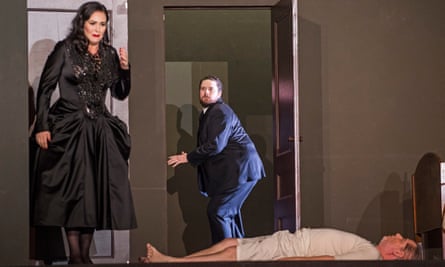It’s unusual for a director to write about her work, apart from texts for programme notes. What should I write about? I can start with what I don’t want to write about. Addressing the question of whether we can still perform Don Giovanni today? (Spoiler: we can). Not that the question isn’t relevant, but the production itself should be the answer. Explaining the meaning of the staging? Again, the production should speak for itself. Analysing the piece and exposing the various theories and interpretations of Da Ponte’s libretto and Mozart’s music? It would take more than a page in the Guardian, and it’s the job of academics. As a stage director, I’ve done my homework, but like the stitches in a dress, it shouldn’t be apparent. It’s the result that counts.
One definition of my job is telling the story. Sounds simple enough. What is the plot of Don Giovanni? Act one, scene one. Leporello is playing sentry for his master at night in front of Donna Anna’s house. Fighting is heard. Don Giovanni and Donna Anna storm out. He is masked, she is furious: he has attempted to rape her, and she intends to find out who he is. No, wait – in many productions I’ve seen, she’s following him because she loves him and doesn’t want to let him leave: the rape thing is a lie made up to protect her honour. We’re not five minutes into the story, and it isn’t clear what happened. Funny how on the opera stage just as in real life, it seems people have a hard time figuring out the truth when it comes to rape. How do we deal with this in real life? Inquiries, investigations, trials – we try to understand what happened. But what is the truth in a play? There are no facts beyond the words said on stage. There are some clues. The full title of the piece (Don Giovanni, ossia il dissoluto punito – “or the punishment of a dissolute man”); the context – historically, it is unlikely that the authors would have represented respectable Donna Anna as sexually turned on by a man to the point of following him on to the street; also literary tradition and history – the idea that a character has dark and subconscious desires would be anachronistic: in 1787, characters pretty much mean what they say. This is where the homework helps in understanding what the authors might have meant. You could call that historically informed reconstitution.

Alternatively, you could consider that the piece itself constitutes a world of its own. An existentialist approach, where the “truth” is the sum of all the words, music and actions the piece contains, and where the characters are solely defined by what they say and do. That world is ours to investigate. There is no truth outside of the piece, there are no witnesses we can interrogate, no new pieces of evidence we can discover. The piece is all we’ve got: interpretation is unavoidable.
But don’t be fooled by the apparent objectivity of facts unfolding before your eyes: there is always someone telling the story, no matter how invisible. It isn’t about the costumes, or when and where it’s set. It’s about how you tell the story, from whose point of view you tell it, and which story you’re telling in the first place. Why characters say what they say, to what extent they mean what they say, how they relate to one another. That can be done in period costume or in jeans. Some productions in jeans can be incredibly dusty in the way they approach the relationships; some in powdered wigs and corsets can be more modern than you think. “Transposing”, or deciding that the piece is set in, say, 1950 or Seville or a spaceship, is in many cases a relatively superficial aesthetic choice, not a deep statement in terms of storytelling.
A great work of art, by definition, lends itself to multiple, even contradictory interpretations. That is even more true of performing arts, which exist for and through a live audience. Think of how the 19th century read Shakespeare. Similarly, Don Giovanni has known many lives since his creation in Prague in 1787 (not to mention the textual tradition, which is much older), from a libertine deserving to be punished, to a romantic hero with a tragic and glorious end, to the embodiment of psychoanalytical complexity or sexual liberation. All this is relevant and can be justified in the text. We interpret as we like, but we must remember that we are interpreting in the first place. In today’s context, considering that Donna Anna is lying when she accuses Don Giovanni of assaulting her (which she vehemently and consistently does throughout the piece), far from the refreshingly provocative reading it once was, seems to reflect the sadly ubiquitous reality of women not being believed in their accusations.

When I talk about interpretation, I don’t mean a militant turning upside down of pieces; often, it’s just a careful, detailed reading of the text, and decisions about who the characters are and how they interact. Take Don Ottavio, for instance – Donna Anna’s fiance. In almost all the productions I’ve seen, he is boring, conventional and unsexy. That is one truth, and it’s consistent with the idea that Anna secretly desires Giovanni. But there is another truth. When in doubt, read the text: “My happiness depends on hers. I can’t have joy if she doesn’t.” He stands in marked contrast to Giovanni, whose first action on stage is a rape attempt, and who listens solely to his own desires. Interesting that, in the shatteringly detailed scene where Anna tells Ottavio how she struggled and broke free from her assailant, Ottavio’s reaction of relief traditionally gets a laugh: I was taught that poor Ottavio was ridiculous because all that mattered to him was that his fiancee was still a virgin. But he is not selfish: simply empathic. Surely we have evidence for that? What if he really cares about what happens to her? Is that what was considered ridiculous when I was growing up?
The work I do isn’t always visible. It’s not a big concept that you can sum up in a few sentences. It’s probably even subliminal at times. Like the preparatory homework, I don’t necessarily want it to show. It’s made to find the interpretation that feels relevant to me, step by step, and to tell the story accordingly.
In this, some things might be straightforward, others more elusive, as is the work itself. In his very first line, Don Giovanni says: “You’ll never know who I am.” And who is he really? Once a figure of rebellion against conventions, he has come to embody what many rebel against today – a man blindly following his desires, using his social position in order to get women. In the opera, Don Giovanni defies the statue of the Commendatore, Donna Anna’s father, whom he has murdered; but in today’s world, many people would consider Giovanni himself a patriarchal figure whose statue they would gladly topple.
The opera can be read on many levels. It’s a whodunnit with a good deal of comedy; it’s a psychological study of a man addicted to sex (or love); it’s a reflection on seduction and power; it’s a philosophical statement on how absolute freedom makes life in society impossible; it’s an exploration of what it means to have no boundaries to one’s desires. As a director, you can’t cover it all. You have to make choices and sacrifices. But you can leave doors ajar, drop hints, and invite people to get their imaginations going.
Just as there isn’t a correct interpretation of a work, there is no right or wrong reading of a staging. A staging isn’t a riddle with a hidden answer. It is telling one story to a wide range of very different people. An audience is a sum of individuals, and each individual’s point of view is legitimate – in fact, that is the only legitimacy there is: to have a ticket and be sitting there. Some have seen a dozen productions of Don Giovanni, others will barely know the plot. I try to be as multilayered as possible: if you’re seeing it for the first time, it’s about the plot, but if you’re a connoisseur, it’s also about offering new perspectives. I don’t think audiences should waste their energies figuring out what they are supposed to understand: after all, they have come to enjoy themselves, and there is no one waiting outside with an exam. If anything, I am the one who will be graded. But frankly it isn’t worth the audience’s time to think of the grade they’d give me either; all I would like is to get them thinking.
Stay connected with us on social media platform for instant update click here to join our Twitter, & Facebook
We are now on Telegram. Click here to join our channel (@TechiUpdate) and stay updated with the latest Technology headlines.
For all the latest Music News Click Here
